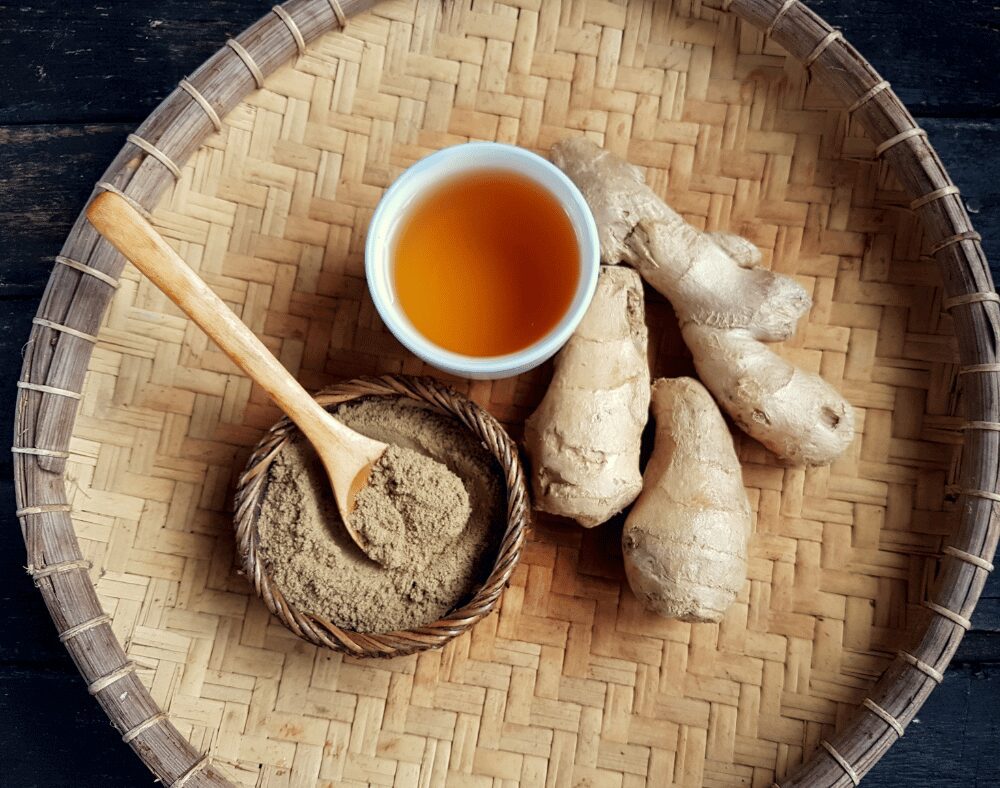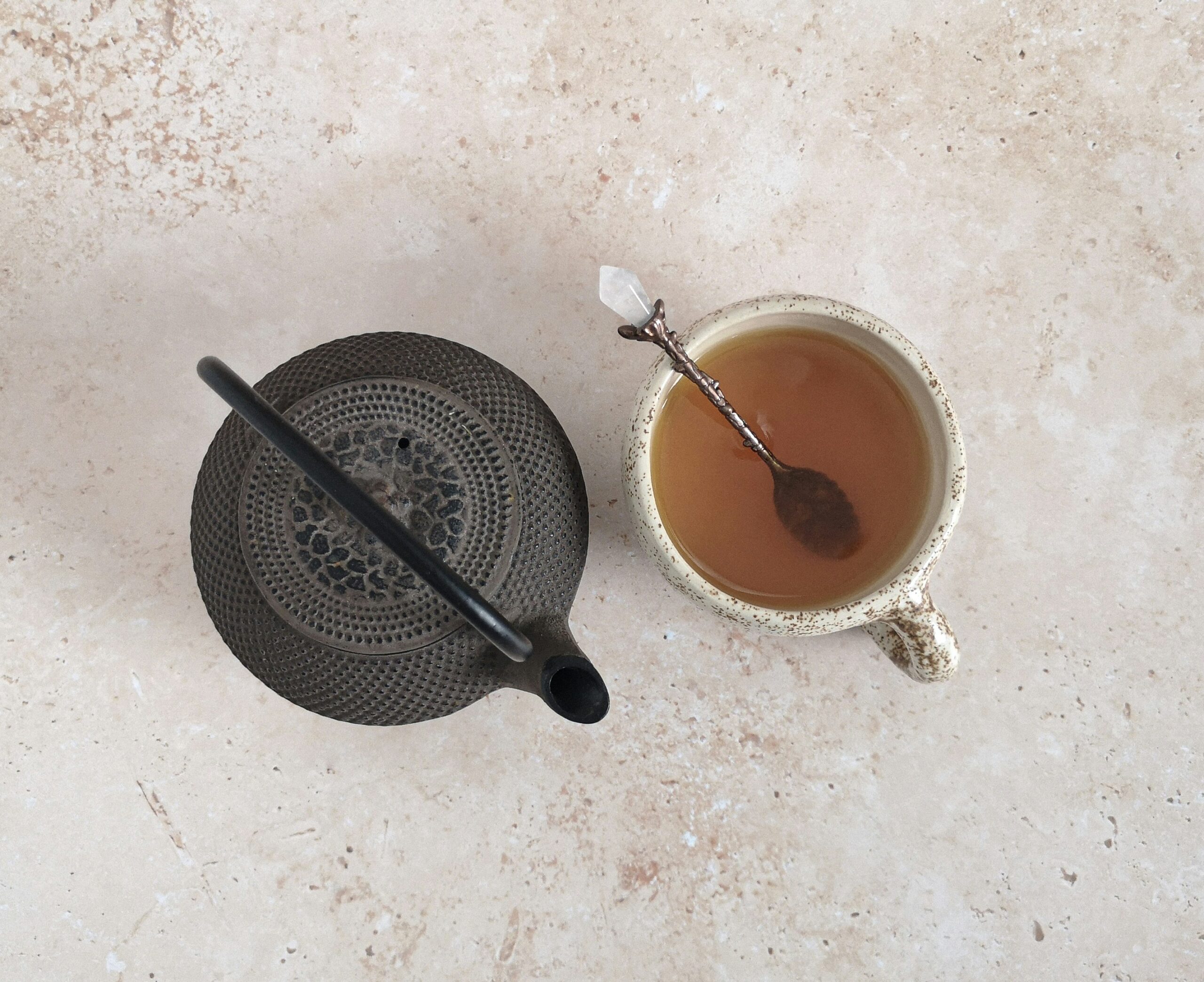Wild Ginger … or just ginger, known scientifically as Zingiber officinale, has been embraced for centuries in various traditional medicine practices for its potent health benefits. This versatile root, characterised by its distinctive spicy flavour and aroma, has a rich history of use, ranging from culinary applications to natural remedies. In herbal medicine, it’s commonly utilised to address digestive issues, nausea, and cold symptoms, reflecting its many uses due to its therapeutic properties.

In the realm of modern medicine, ginger continues to capture the interest of researchers due to its potential role in treating and managing various health conditions. Its bioactive compounds, such as gingerols and shogaols, have been studied for their anti-inflammatory and antioxidant effects. Although ginger is widely regarded as safe for most people, it’s important to be mindful of its interactions with certain medications and its use in specific populations, like pregnant individuals.
Key Takeaways
- Ginger is a well-beloved component in herbal medicine, known for its broad spectrum of health benefits.
- Research into ginger’s therapeutic properties is ongoing, highlighting its relevance in traditional and contemporary health contexts.
- Consideration of potential interactions and appropriate use is essential for safely integrating ginger into your wellness routine.
What are we talking about today?
- Wild Ginger and its historical and cultural significance
- Active constituents of ginger
- Health benefits and uses
- Safety, interactions and considerations
- Wild Ginger in modern research and medicine
- Preparation and dosage of ginger remedies
… Did I miss any topics you’re interested in? Shoot – drop me a comment below!
Wild Ginger and its Historical and Cultural Significance

Origins and History
Wild Ginger (Zingiber officinale), boasting active components like gingerol and shogaol, has a fascinating history stretching back over 5,000 years in Asia. It’s like taking a step back in time to India and China, where ginger was more than just a culinary staple – it was a trusted remedy for various ailments, too. Even Confucius wrote about the use of ginger, highlighting its integral role in Chinese culture.
Ginger’s use and knowledge spread in Asia through traditional medicine systems like Ayurveda in India. These systems systematically documented ginger’s health benefits and practices. The medicinal root would then travel along the Silk Road, influencing various cultures.
Cultural Uses and Beyond
Ginger has been a core and central to Indian and Chinese culture, traditions and cuisine for thousands of years as part of rituals and day-to-day lives.
Ginger is not only a delicious ingredient in many dishes but also has medicinal properties. In India, for instance, ginger is a key ingredient in the beloved chai tea, a drink that is steeped in cultural tradition.
Ginger’s global journey meant landing in the culinary and healing traditions in regions like Latin America and the Caribbean, thanks to Spanish and Portuguese introductions. Its zesty warmth quickly made it a favourite in flavouring dishes and natural remedies, highlighting its adaptability across different cultures and health routines.
Active Constituents of Ginger
Wild Ginger (Zingiber officinale) has been recognised for its medicinal properties for centuries, and these benefits stem from its rich variety of bioactive components. Here’s a closer look at what makes ginger so valuable for your health.

Primary Bioactive Compounds:
- Gingerols: These are the most abundant compounds in fresh ginger. They’re known for their anti-inflammatory and antioxidant properties and give ginger its distinct spicy flavour.
- Shogaols: These compounds are produced when ginger is dried. They’re associated with pain relief and stomach-settling effects.
- Zingerone: This component becomes more prominent when ginger is cooked. It offers a sweet flavour along with its antioxidant benefits.
Health Benefits and Uses
Ginger is regarded to offer several health benefits, particularly targeting digestion, inflammation, and blood sugar regulation. Explore its uses to understand how it may suit your wellness routine.
Digestive Aid and Nausea Relief
Ginger is well-known for its ability to alleviate digestive problems and relieve nausea. Whether you’re experiencing morning sickness or motion sickness, ginger supplements can provide relief. Ginger tea is also a gentle and effective way to soothe your stomach and aid digestion.
Anti-Inflammatory and Arthritis Treatment
The compounds gingerol and shogaol in ginger have anti-inflammatory properties. As such, Ginger may assist in relieving joint pain and swelling in conditions like osteoarthritis and rheumatoid arthritis.
Managing Blood Sugar and Diabetes
Incorporating ginger into your diet could be beneficial in managing blood sugar levels, making it a valuable addition for people with diabetes. Consistent intake of ginger has been linked to improved insulin sensitivity, but it should be used carefully and with the guidance of a medical professional.
Cold and Flu Symptom Alleviation
If you’re not feeling well, ginger tea imay be a great option to alleviate cold and flu symptoms. Its natural anti-inflammatory properties can also help soothe sore throats. Additionally, it boosts your immunity, which helps your body fight infections.
Safety, Interactions, and Considerations
As with anything in life, getting the wrong dosage can pose more health risks than benefits. And so when incorporating ginger into your health regimen, it’s important to be aware of its interactions with medications and its suitability for different populations. Ensuring the safe use and understanding ginger’s regulatory status are crucial steps to avoid potential side effects.
Medicinal Interactions and Side Effects
Ginger is generally considered safe, but it can interact with certain medications, particularly blood thinners like warfarin. If you’re on an anticoagulant (or blood-thinning medication), ginger may increase your risk of bleeding. Additionally, ginger supplements might affect blood clotting and should be used cautiously if you have a bleeding disorder. Before surgery, it’s recommended to stop taking ginger due to these bleeding risks.
Ginger might also lower blood pressure and have additive effects if you’re on medication for high blood pressure or heart disease. Common side effects include stomach discomfort, heartburn, and vomiting when taken in large doses.
- Interactions:
- Blood thinners: Increased bleeding risk
- Blood pressure meds: Additive blood pressure-lowering effects
- Diabetes medications: Affects blood sugar levels
Recommendations for Special Populations
Pregnant women often use ginger to alleviate morning sickness, but should do so under the guidance of a healthcare professional to ensure safety. Similarly, if you’re living with a health condition like a heart disease or taking any form of medication, consulting with a healthcare provider is essential prior to starting ginger supplements. This is to prevent any potential interactions with your current medications or conditions.
- Special Populations:
- Pregnant women: Consult healthcare provider before use
- Those with health conditions: Seek medical advice before combining with existing medication regimen
Regulatory Status and Quality Control
In the United States, the Food and Drug Administration (FDA) does not regulate dietary supplements, including ginger supplements, with the same level of rigor it does with prescription medications.
Consequently, the quality and concentration of ginger supplements may vary between products.
Hence it is always best to opt for supplements that have been third-party tested for efficacy and purity, and to read labels for FDA disclaimers.
- Quality Control:
- Look for third-party tested products
- Check for FDA disclaimers regarding efficacy and safety
Wild Ginger in Modern Research and Medicine
In recent years, Wild ginger has been the subject of intense scrutiny in medical research, revealing its potential as an adjuvant in cancer treatment and a remedy in alternative medicine.
Recent Studies on Ginger’s Efficacy
Studies have shown that ginger extracts, containing gingerols and shogaols, possess antioxidant and anti-inflammatory properties. These qualities can help reduce oxidative stress and the formation of free radicals, which contribute to aging and various diseases. One review has found that ginger may aid in decreasing swelling, promoting brain health, and lowering cholesterol levels.
Potential in Cancer Treatment and Prevention
Wild Ginger has a wide range of bioactive compounds, particularly ginger extracts, which are being studied in relation to cancer. Research suggests that these extracts may help prevent colorectal, gastric, and liver cancer. For cancer patients undergoing chemotherapy, ginger has demonstrated positive results in influencing a reduction of symptoms in clinical trials such as nausea, and it may even enhance the effectiveness of chemotherapy drugs.
Ginger’s Role in Alternative Medicine
Wild Ginger is a commonly used herb in alternative medicine to treat various ailments such as constipation, migraines, and to alleviate the symptoms of chronic diseases like Alzheimer’s. Some people believe that consuming ginger capsules or the raw herb can help regulate insulin levels and maintain intestinal health. Ginger is often included in dietary regimens due to its perceived role in promoting overall well-being.
Remember, while the potential health benefits of ginger are promising, it’s important to consult with a healthcare provider before starting any new treatment, especially if you are a cancer patient or suffer from any chronic conditions.
Preparation and Dosage of Ginger Remedies
Ready to infuse Wild Ginger in your wellness routine? We go over the best ways to prepare Ginger so you can maximise its health benefits.
Ginger Tea
To enjoy ginger tea, begin by peeling and slicing fresh ginger root. Use approximately one to two teaspoons of grated ginger for each cup of boiling water. Steep the ginger in the boiling water for 10 to 15 minutes. You can add honey or lemon to taste, according to your preference. If you’re aiming to relieve nausea or digestive issues, it’s often recommended to drink ginger tea two to three times daily.
Read our post on “The So-Called Healing Power of Herbal Tea” for a deep dive on the benefits of herbal tea for your wellness routine.
Ginger Capsules and Tablets
Ginger capsules and tablets are convenient for consistent dosing. A common dosage for adults is 1000 mg of ginger per day, which can be taken in divided doses. Always follow the manufacturer’s instructions or consult with a healthcare provider to determine the correct dosage for your needs.
Tincture and Extracts
Another way to incorporate ginger into your routine is by using tinctures and extracts. A typical dose ranges from 1.5 to 3 ml of ginger tincture, taken three times a day. To ensure you’re using a quality product, check if the tincture is made with fresh or dried ginger, as their potencies may differ.



Comments +